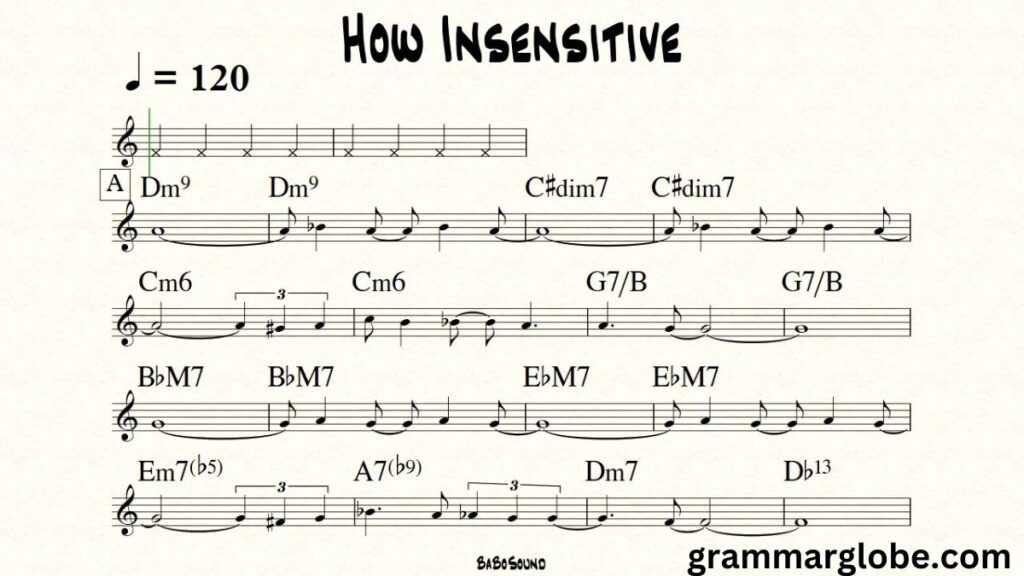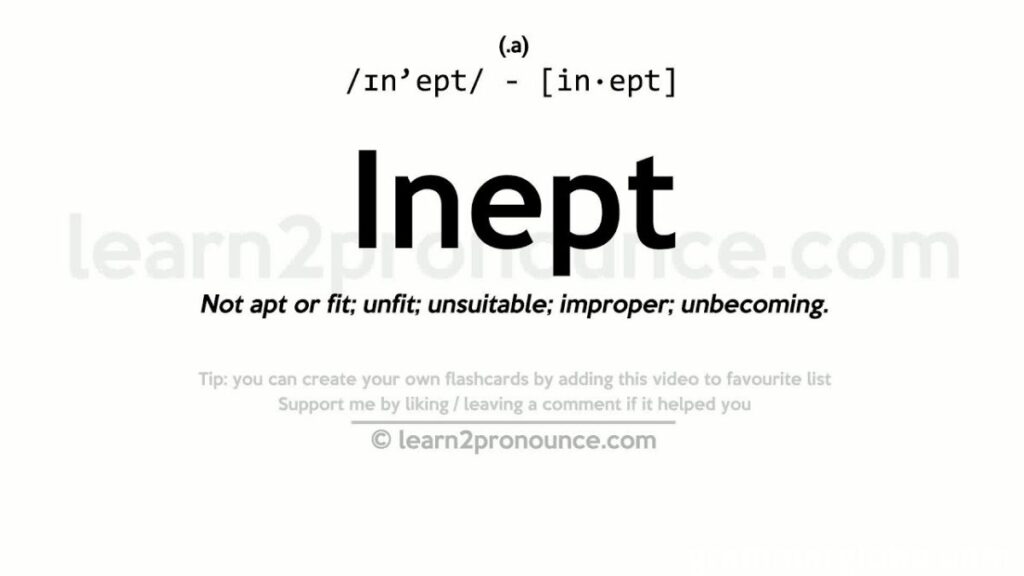The phrase “tone-deaf” has two meanings: one literal and one figurative. Literally, it refers to someone who lacks musical ability. Figuratively, it describes someone who is insensitive, unaware, or socially clueless. In many situations, using a synonym from the 16 Synonyms for “Tone-Deaf” can enhance your communication skills and make your language more precise.
Whether you’re writing an article, having a conversation, or improving your interpersonal relationships, knowing alternative ways to describe tone-deaf behavior is essential. This article explores 16 powerful synonyms for “tone-deaf”, divided into two categories:
- Social and Emotional Insensitivity (People who lack emotional intelligence and fail to read social cues.)
- Musical or Artistic Deficiency (Individuals who struggle with pitch, melody, or harmony.)
Let’s dive into these alternatives and learn when to use them.
Insensitive
An insensitive person disregards others’ feelings or emotions, often causing unintentional harm. They may speak or act without considering the impact of their words or behaviors, leading to tension in both personal and professional relationships. Insensitivity can result from a lack of emotional awareness or simple carelessness.

In workplaces, an insensitive manager might ignore employees’ concerns, creating an environment of dissatisfaction and resentment. This behavior damages morale and weakens team cohesion, ultimately affecting productivity and engagement. Leaders should prioritize emotional intelligence to foster a more inclusive culture.
Socially, an insensitive individual may joke about sensitive topics or fail to recognize when someone is in distress. They might dismiss concerns or fail to offer support when needed, leaving others feeling unheard. A more mindful approach to communication can prevent these issues.
To address insensitivity, individuals should focus on developing empathy and active listening skills. By being more mindful of how words and actions affect others, they can create a more supportive and understanding environment.
Rude
Being rude means acting in a way that is impolite, abrupt, or lacking in respectful communication. Rudeness often stems from disregard for social norms, leading to interactions that feel abrasive or confrontational. This behavior can create friction in both casual and formal settings.
In professional settings, rudeness can manifest as interrupting colleagues, dismissing ideas without consideration, or using harsh language. Such behavior can hinder collaboration and create a hostile work environment. Practicing politeness and diplomacy can significantly improve workplace interactions.
In social scenarios, rude behavior may include ignoring invitations, making offensive remarks, or failing to acknowledge others’ presence. People who display consistent rudeness often struggle to maintain meaningful relationships, as their actions push others away.
Correcting rude behavior involves self-awareness and effort to consider others’ perspectives. By actively practicing kindness, patience, and attentiveness, individuals can foster better connections and healthier communication habits.
Inconsiderate
Someone who is inconsiderate fails to think about how their actions affect others. They may act selfishly or thoughtlessly, disregarding the needs or feelings of those around them. This can lead to frustration and resentment in both personal and professional relationships.
Inconsiderate behavior in the workplace includes failing to meet deadlines, speaking over others in meetings, or taking credit for someone else’s work. These actions can demoralize colleagues and create an unproductive environment. Awareness of team dynamics and shared responsibilities can help mitigate this behavior.
Socially, an inconsiderate person may monopolize conversations, cancel plans without notice, or fail to respect personal boundaries. Such actions can lead to strained friendships and alienation, making it difficult to maintain positive relationships.
Addressing inconsiderate tendencies requires self-reflection and intentionality. By actively thinking about how actions impact others and making an effort to be more mindful, individuals can cultivate stronger and more positive connections.
Unperceptive
An unperceptive person struggles to pick up on social cues or subtle emotional signals. This can lead to misunderstandings, as they may fail to recognize when someone is uncomfortable, upset, or in need of support. Unperceptiveness often stems from a lack of attentiveness rather than malice.

In workplaces, an unperceptive leader may miss signs of employee dissatisfaction, leading to a disengaged team. They may also struggle to gauge appropriate reactions in professional interactions, affecting their ability to build strong working relationships.
In social situations, an unperceptive individual may talk about topics that make others uncomfortable or fail to notice when someone is trying to exit a conversation. This lack of awareness can lead to awkward interactions and make others hesitant to engage with them. Synonyms for “Tone-Deaf”
Improving perceptiveness involves actively observing others and listening carefully during conversations. By becoming more attuned to verbal and nonverbal cues, individuals can enhance their interpersonal skills and build deeper connections.
Clueless
Being clueless means lacking knowledge or cognitive awareness about a situation. A clueless person may not understand social expectations or fail to recognize important contextual details, leading to awkward or inappropriate behavior.
In professional settings, a clueless employee might misunderstand instructions, misinterpret feedback, or struggle to navigate office dynamics. This can make them less effective in their roles and create frustration for their colleagues.
Socially, clueless individuals may be unaware of cultural norms, fail to recognize sarcasm, or miss nonverbal signals indicating discomfort. These gaps in understanding can make social interactions challenging and lead to unintended offense.
To overcome cluelessness, individuals should seek feedback, observe social dynamics, and ask clarifying questions when needed. Developing situational awareness and learning from past mistakes can significantly improve one’s ability to navigate various environments. Synonyms for “Tone-Deaf”
Unaware
An unaware person lacks knowledge or recognition of what is happening around them. They may unintentionally offend others due to their inability to pick up on social cues or emotional shifts. This lack of awareness can hinder both personal and professional interactions.
In workplaces, unaware individuals may fail to recognize when a colleague is struggling or ignore non-verbal communication that signals dissatisfaction. This can lead to misunderstandings and strained working relationships. Awareness training can help improve communication skills and interpersonal relationships.
In social settings, being unaware can lead to inappropriate comments, failure to understand sarcasm, or missing out on key contextual details in conversations. This can make it difficult to form meaningful connections with others.
To become more socially aware, individuals can engage in empathy training, actively listen, and observe body language. Increasing cognitive awareness enhances the ability to respond appropriately to different social situations.
Oblivious
Someone who is oblivious is completely unaware of their surroundings or the impact of their actions. They often miss social signals, leading to awkward interactions or unintended insensitivity. Synonyms for “Tone-Deaf”
In professional environments, oblivious individuals may fail to notice workplace tensions, ignore team dynamics, or be unaware of how their words affect colleagues. This lack of perception can hinder effective teamwork and career advancement.

Socially, oblivious people might fail to realize when someone is uncomfortable or disengaged in a conversation. They may overstep boundaries or fail to pick up on indirect hints, causing frustration among peers.
Improving social awareness through self-reflection, active listening, and respectful communication can help overcome oblivious tendencies. By being more mindful, individuals can build stronger and more empathetic relationships.
Indiscreet
An indiscreet person lacks discretion in speech, often sharing private or sensitive information without considering the consequences. Their tendency to speak without filtering their thoughts can lead to damaged relationships and loss of trust.
In workplaces, indiscreet behavior can involve revealing confidential company information, gossiping about colleagues, or making inappropriate remarks during meetings. This not only affects professionalism but also creates an atmosphere of distrust and discomfort.
Socially, an indiscreet individual may blurt out personal details in public or fail to keep secrets. They may also overshare on social media, unaware of the potential impact on their reputation or relationships. Such behavior can make others hesitant to confide in them. Synonyms for “Tone-Deaf”
Developing cognitive awareness and practicing professional etiquette can help individuals become more tactful in conversations. Learning when to speak and when to stay silent is key to maintaining positive relationships.
Unsympathetic
An unsympathetic person shows little or no compassion for others’ struggles or emotions. They may dismiss concerns, downplay problems, or fail to offer support when needed, making them appear cold or unfeeling.
In professional settings, an unsympathetic manager might ignore employee burnout or fail to acknowledge personal hardships. This can lead to decreased job satisfaction and higher turnover rates. Compassionate leadership, on the other hand, fosters a supportive workplace culture. Synonyms for “Tone-Deaf”
Socially, unsympathetic individuals may trivialize others’ emotions, offering unhelpful advice instead of genuine understanding. For example, they might respond to someone’s distress with, “You’re overreacting,” rather than showing empathy.
To counteract this, practicing empathy training and developing listening skills can improve one’s ability to connect with others emotionally. Recognizing and validating feelings strengthens both personal and professional bonds.
Inattentive
An inattentive person fails to pay attention to details, conversations, or surroundings. Their lack of focus can lead to misunderstandings and missed opportunities in both personal and professional interactions.
At work, inattentiveness might result in overlooked deadlines, forgotten tasks, or poor meeting participation. These habits can hinder career growth and frustrate colleagues who rely on clear communication and accountability. Synonyms for “Tone-Deaf”
In relationships, inattentive individuals may frequently zone out during conversations, fail to remember important events, or ignore non-verbal cues. This can make loved ones feel neglected or unimportant, leading to strained connections.
Developing better listening skills and practicing mindfulness can help reduce inattentiveness. By making a conscious effort to stay engaged, individuals can enhance their communication skills and strengthen relationships.
Unthoughtful
Being unthoughtful means acting without considering others’ feelings or needs. This can manifest as neglecting small gestures of kindness, failing to show appreciation, or disregarding how actions affect those around them.

In professional environments, unthoughtful behavior may include ignoring colleagues’ efforts, failing to acknowledge contributions, or making unilateral decisions without team input. This can lead to resentment and decreased motivation among employees.
Socially, an unthoughtful friend might forget birthdays, make insensitive jokes, or fail to check in during difficult times. While these actions may not be intentionally hurtful, they can still damage relationships over time.
Practicing mindful word choice and making an effort to show appreciation can go a long way in fostering positive interactions. Small acts of thoughtfulness, like expressing gratitude or remembering important details, make a significant difference.
Uncaring
An uncaring person displays a lack of concern for the feelings, well-being, or circumstances of others. They may be indifferent to suffering, dismissive of emotions, or unwilling to offer help when needed. This behavior can make them seem distant or emotionally disconnected, creating barriers in relationships.
In a professional setting, an uncaring boss might ignore employees’ struggles, refuse to acknowledge their hard work, or make decisions without considering their impact on the team. Such leadership fosters dissatisfaction, high turnover rates, and decreased motivation among employees. Workplace empathy and professional etiquette are essential for cultivating a supportive environment.
Socially, uncaring individuals may fail to check on friends during tough times, disregard important life events, or make insensitive remarks. Their lack of empathy can lead to weakened friendships and difficulty forming meaningful connections. Strong interpersonal skills help build lasting relationships.
To counteract an uncaring attitude, individuals must develop empathy training techniques, actively listen, and practice compassion. Small gestures—like offering words of encouragement, being present in difficult moments, and showing concern—go a long way in fostering positive relationships.
Impolite
Being impolite means disregarding basic social norms of politeness, such as saying “please” and “thank you,” respecting personal space, or speaking in a considerate tone. Impoliteness can be intentional or unintentional, but it often makes social interactions unpleasant.
In professional environments, impolite behavior can damage workplace relationships. Interrupting others, failing to acknowledge contributions, or speaking in a dismissive tone can create friction among colleagues. Effective workplace communication requires a balance of assertiveness and respect to foster collaboration.
On a personal level, impolite individuals may cut people off mid-sentence, ignore greetings, or fail to acknowledge social cues. This behavior can make them seem arrogant or self-absorbed, pushing others away. Practicing social etiquette can help improve interactions and prevent misunderstandings.
Correcting impoliteness requires self-awareness and intentionality. Simple actions—like maintaining eye contact, using polite language, and respecting others’ perspectives—can make a significant difference in social and professional settings. Being courteous enhances one’s reputation and strengthens relationships. Synonyms for “Tone-Deaf”
Unmusical
The term unmusical describes someone who lacks musical talent, rhythm, or an appreciation for melody and harmony. Unlike being “tone-deaf,” which often refers to an inability to perceive pitch, unmusicality encompasses a broader deficiency in musical expression and appreciation.
In an artistic context, an unmusical performer may struggle with maintaining rhythm, staying on key, or expressing emotion through music. While some people naturally excel in musical ability, others can improve through practice, listening exercises, and structured training. Understanding language nuances in music, such as tempo and phrasing, helps develop musical sensitivity.
An unmusical individual might also lack an appreciation for music, failing to recognize why certain pieces evoke emotions or tell stories. While this isn’t inherently negative, it can make discussions about music or cultural appreciation difficult, especially in social settings where music plays a key role. Synonyms for “Tone-Deaf”
Developing musical awareness doesn’t require becoming a musician; rather, it involves actively listening, exploring different genres, and learning about musical structures. Engaging with music in a mindful way enhances cultural appreciation and cognitive awareness.
Inept
Someone who is inept lacks skill, competence, or effectiveness in a particular area. The term can apply to various situations, from social interactions to professional performance. Ineptitude can stem from inexperience, poor judgment, or an inability to read social cues.

In the workplace, an inept employee may struggle with decision-making, fail to complete tasks correctly, or misinterpret instructions. This can lead to inefficiency, miscommunication, and frustration among colleagues. Training programs, mentoring, and constructive feedback can help improve performance and communication skills.
Socially, inept individuals might be awkward in conversations, fail to pick up on nonverbal cues, or unintentionally say inappropriate things. Their lack of discretion in speech can lead to misunderstandings and strained relationships. Developing listening skills and observing others’ interactions can help refine social abilities. Synonyms for “Tone-Deaf”
To overcome ineptitude, individuals should seek learning opportunities, embrace feedback, and practice social awareness. With time and effort, anyone can improve their interpersonal relationships and professional competence, leading to more meaningful interactions and better career prospects.
Disharmonic
The word disharmonic refers to something that is out of sync, uncoordinated, or lacking in harmony. While often used in music, it can also describe social situations, conversations, or behaviors that feel jarring or out of place.
In a musical sense, disharmonic compositions may sound unpleasant or clash due to dissonance. This can be intentional in certain genres, but when unintended, it disrupts the flow of music. Similarly, disharmonic speech patterns—such as speaking at an inconsistent pace or failing to match the tone of a conversation—can make interactions feel disjointed. Synonyms for “Tone-Deaf”
Socially, disharmonic behavior may involve saying inappropriate things at the wrong time, failing to align with group dynamics, or disrupting the natural flow of interactions. This often results from a lack of cultural sensitivity or respectful communication. Understanding the semantic entities that guide social interactions can prevent discomfort.
To cultivate harmony in conversations and relationships, individuals should observe group norms, adjust their tone and pace accordingly, and remain attentive to social cues. Whether in music or communication, developing a sense of balance and coordination fosters smoother, more engaging interactions.
Conclusion
Choosing the right Synonyms for “Tone-Deaf” enhances effective communication. Whether in workplace communication, interpersonal relationships, or social etiquette, using precise words fosters positive relationships and prevents miscommunication. Understanding the nuances of these synonyms allows for better expression and improved social interactions.
Next time you describe social blunders or musical inability, use one of these 16 Synonyms for “Tone-Deaf” instead. Expanding vocabulary and refining word choice contributes to more thoughtful and meaningful communication.

Jenni Maic is a creative wordsmith at Grammar Globe, where she brings humor and wit to the world of puns and English grammar. With a passion for playful language and a knack for simplifying grammar, Jenni’s articles make learning engaging and entertaining. Discover her work at https://grammarglobe.com/.







